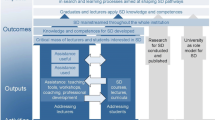Abstract
This chapter explores the opportunities and challenges of humanising higher education through sustainable development education and climate action. Using the framework of head, hand, heart (Devis-Rozental 2018) the premise of ‘Play with Purpose’ and the metaphor of the ‘Tree of Life’ (Sinha 2018), the chapter creates positive landscapes for change, bringing together contemporary theory and practice that provides guidance and inspiration for practitioners and academics working in this area, to be part of the community of practice of educators and professionals supporting, inspiring and challenging our future leaders and colleagues. We need to transform our HE system, and link it to positive change to protect our planet from further harm, in so doing give ourselves the best chance of a fulfilled and beautiful life.
Access this chapter
Tax calculation will be finalised at checkout
Purchases are for personal use only
Similar content being viewed by others
References
Brown, J. E. (1989). The sacred pipe: Black elk’s account of the seven rites of the Oglala Sioux [online]. Oklahoma: University of Oklahoma.
Cooperrider, D. L., & Whitney, D. (2001). A positive revolution in change: Appreciative inquiry. Public Administration and Public Policy, 87, 611–630.
Csikszentmihalyi, M. (1997). Flow and creativity. Namta Journal, 22(2), 60–97.
Devis-Rozental, C. (2018). Developing socio-emotional intelligence in higher education scholars. London: Palgrave.
Dunne, R. (2015). Applying the principles of harmony to learning. Place of publication? Food and Culture.
Hiatt, J. (2006). ADKAR: A model for change in business, government, and our community. Prosci. Available from: https://sustainablefoodtrust.org/articles/applying-the-harmony-principles-to-learning/. Accessed 29 January 2020.
Intergovernmental Panel on Climate Change. (2018). Global Warming of 1.5°C: An IPCC Special Report on the Impacts of Global Warming Of 1.5°C Above Pre-Industrial Levels and Related Global Greenhouse Gas Emission Pathways, In the Context of Strengthening the Global Response to the Threat of Climate Change, Sustainable Development, And Efforts to Eradicate Poverty. Intergovernmental Panel on Climate Change.
Juniper, T., & Skelly, I. (2010). Harmony: A new way of looking at our world. HarperCollins UK: Place of publication.
Kauffman, S. A. (1993). The origins of order: Self-organisation and selection in evolution. New York: Oxford University Press.
Kearney‚ R. (1988). ‘The Wake of Imagination’. Routeledge.
Manoharan, A. (2019). Creating connections: Polymathy and the value of third space professionals in higher education. Perspectives: Policy and practice in higher education, 1–4.
Roos, J., & Victor, B. (2018). How it all began: The origins of LEGO® serious play®. International Journal of Management and Applied Research, 5(4), 326–343.
Scott Cato, M., & Fletcher, C. (2019). Introducing sell-by dates for stranded assets: Ensuring an orderly transition to a sustainable economy. Journal of Sustainable Finance & Investment, 1–14.
Sinha, T. (2018). The Tree of Life (drawn by Emma Paxton, Imagistic).
Speake, J. (2009). The oxford dictionary of proverbs (5th ed.). Oxford: Oxford University Press.
University of Winchester. (2020). Sustainability statement. Available from: https://www.winchester.ac.uk/about-us/sustainability-and-social-justice/sustainability-statement/. Accessed 27 April 2020.
Wobser, C. (2015). Gathering of the 13 Indigenous Grandmothers. Kent State University Conference Proceedings Lorraine Bayes. https://oaks.kent.edu/starkstudentconference/2015/Program/12. Accessed 27 April, 2020.
World Commission on Environment and Development, & Brundtland, G. H. (1987). Presentation of the Report of the World Commission on Environment and Development to the Commission of the European Communities, the EC and EFTA Countries.5 May 1987, Brussels. World Commission on Environment and Development.
Author information
Authors and Affiliations
Corresponding author
Editor information
Editors and Affiliations
Rights and permissions
Copyright information
© 2020 The Author(s)
About this chapter
Cite this chapter
Sinha, T. (2020). Humanising Our Experience in Higher Education Through Sustainable Development Education. In: Devis-Rozental, C., Clarke, S. (eds) Humanising Higher Education. Palgrave Macmillan, Cham. https://doi.org/10.1007/978-3-030-57430-7_15
Download citation
DOI: https://doi.org/10.1007/978-3-030-57430-7_15
Published:
Publisher Name: Palgrave Macmillan, Cham
Print ISBN: 978-3-030-57429-1
Online ISBN: 978-3-030-57430-7
eBook Packages: EducationEducation (R0)




